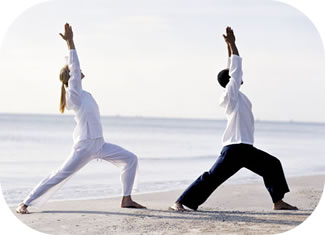Tai Chi and Yoga
 Tai Chi is an ancient practice that involves slow, martial art type movements and is designed to promote awareness, balance, flexibility, agility, concentration, mindfulness, proprioception, and improve overall functionality of muscles, bones and joints. Research has shown that fibromyalgia patients who practiced tai chi on a regular basis, discovered that they slept better, experienced less pain, had more energy, and felt healthier overall when compared to fibromyalgia patients who did not practice tai chi (6). It was also reported from this same study that the patients who benefited from Tai Chi asked the researchers to continue the program even after the 24 week study was complete.
Tai Chi is an ancient practice that involves slow, martial art type movements and is designed to promote awareness, balance, flexibility, agility, concentration, mindfulness, proprioception, and improve overall functionality of muscles, bones and joints. Research has shown that fibromyalgia patients who practiced tai chi on a regular basis, discovered that they slept better, experienced less pain, had more energy, and felt healthier overall when compared to fibromyalgia patients who did not practice tai chi (6). It was also reported from this same study that the patients who benefited from Tai Chi asked the researchers to continue the program even after the 24 week study was complete.
Yoga is another low-impact exercise that benefits fibromyalgia patients. Yoga’s popularity has steadily increased in the United States and continues to provide health benefits for multiple illnesses: “Researchers in Oregon who enrolled 53 women aged 21 or older for one particular study showed that women who participated in a regular yoga exercise routine showed significantly greater improvement in fibromyalgia symptoms” (7). This is largely due to the fact that yoga routines promote flexibility and awareness of body movement. Yoga not only helps with coordination, balance and agility, but also promotes relaxation. Yoga involves specific breathing exercises that go hand-in-hand with relaxation and meditation. The interesting dynamic between yoga, relaxation, proprioception and energy all works together to battle the symptoms of fibromyalgia.

